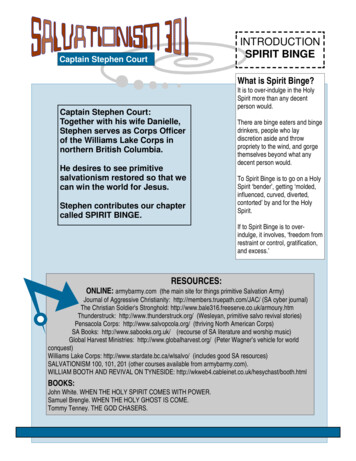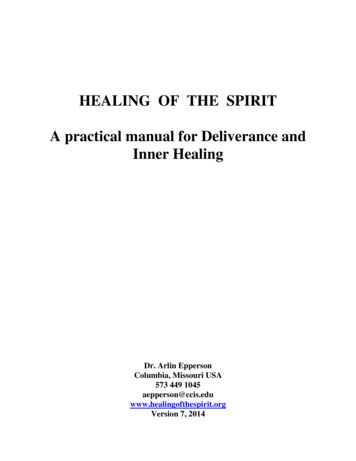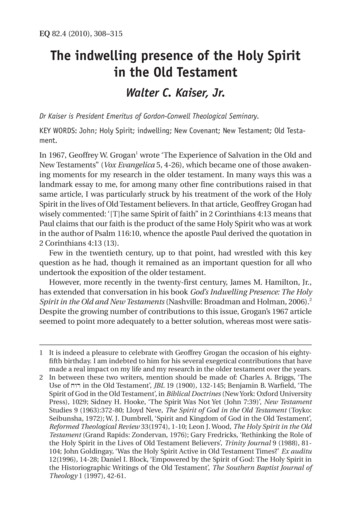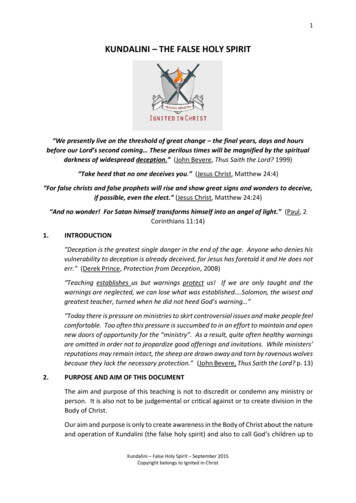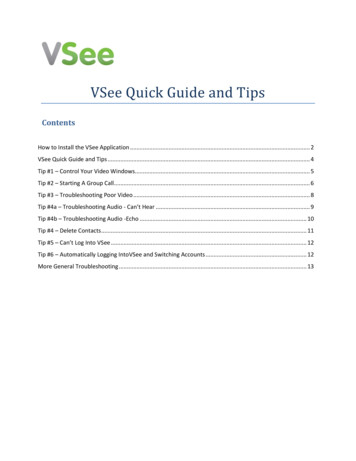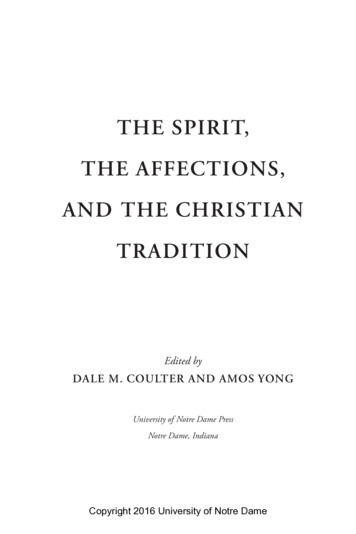
Transcription
The Fruit of the SpiritBible StudyBy Andrew Hancock
Table of ContentsThe Fruit of the SpiritPageWeek 1 Galatians 5:16-263Week 2 Love7Week 3 Joy13Week 4 Peace15Week 5 Romans 8:1-1419Week 6 Patience23Week 7 Kindness27Week 8 Goodness33Week 9 Colossians 3:1-738Week 10 Faithfulness42Week 11 Gentleness46Week 12 Self-Control51Week 13 Summary55Andrew Hancock 2009Scripture taken from:New International VersionEnglish Standard VersionNew American Standard VersionPlease use this study freely, but it is requested that yourefrain from distributing for profit.2
Fruit of the Spirit SeriesForofstartersFruitthe SpiritWelcome to our study on the Fruit of the Spirit! This week we will look at the passage on the fruit of the Spirit,Galatians 5:16-26. The goal of this study is for you to dig into the passage yourself, pull out themes, and make applications to your life. Follow the instructions to the left in order to start discovering the meaning of this importantpassage.Record your observations below:16Instructions:1. Read the entirepassage and to theleft of the text,create bracketswhere you thinkthere are majorsections. Giveeach of thesesections a title.So I say, live by the Spirit, andyou will not gratify the desires of the sinful nature.17For the sinful nature desires what is contrary to the Spirit,and the Spirit what is contrary to the sinful nature.They are in conflict with each other,so that you do not do what you want.18But if you are led by the Spirit, you are not under law.2. Circlekeywords.19The acts of the sinful nature are obvious: sexual immorality,3. Put a boxaround key connective wordssuch as but, for,so. Write outtheir purpose.discord, jealousy, fits of rage, selfish ambition, dissensions,impurity and debauchery; 20 idolatry and witchcraft; hatred,factions 21 and envy; drunkenness, orgies, and the like.I warn you, as I did before, that those who live like thiswill not inherit the kingdom of God.224. Underline andconnect anycomparisons andcontrasts.5. Write out at least5 key observations in the spaceto the right of theverse you are observing.But the fruit of the Spirit islove, joy, peace, patience,kindness, goodness, faithfulness,23gentleness and self-control.Against such things there is no law.24Those who belong to Christ Jesus have crucifiedthe sinful nature with its passions and desires.25Since we live by the Spirit,let us keep in step with the Spirit.26Let us not become conceited,provoking and envying each other.3
For further thoughtOn these, look back into the context of the passage and look up cross-references listed below to help get the answer. What is the law and what does it mean to not be under the law (v. 18)?See Galatians 2:15-16, 3:5, 4:6-7 and Romans 6:14. What does it mean that they will not inherit the kingdom of God (v. 21)? What does it mean to crucify the sinful nature (v. 24)? See 5:16 and Romans 6:5-11.Putit togetherForstartersWrite out at least four themes or principles that you see in this passage: Draw a picture, make a chart, or write a paragraph that captures the message of this passage:4
List any questions you still have about the passage.TheForbigstartersideaCreate a big idea—write out the main point of this passage in 3-6 wordsPut it into ActionWhich sins from Galatians 5:19-21 do you think are most frequently tolerated by Christians today? Why?What verse from this study affected you the most? Why?Write out how you will specifically apply what you learned from this passage.5
DigFordeeperstartersoptional further study section Summarize how this passage relates to Galatians 5:1-15. Read the end of Romans 7 and all of Romans 8. Compare and contrast it with this week‘s passage. From your own experience, describe what it means to live by the desires of the sinful nature. Now by contrast, explain what you think it means to live by the Spirit. Look at Romans 8:5-14 for some ideas. Read Paul's warning about these sinful deeds and one's eternal destiny in Galatians 5:21. How do you harmonize this with Paul‘s earlier statements that salvation is given by grace and received by faith (2:16; 3:18;5:6)? How does the Spirit express His desires to us? How do you know if an internal prompting is from the Spiritof God or simply your own thoughts?Galatians 5:16Scripture Memory verse for this weekSo I say, live by the Spirit, andyou will not gratify the desires of thesinful nature.6
For startersLoveFruit of the Spirit SeriesOnly after we first experience the great love of God will we be able to manifest the fruit of the Spirit in our lives.ForForstartersstarters Think about a person who has truly loved you. How did this person show love? How was this meaningful? Why do you think the search for love dominates songs, books, movies, and the lives of so many people?searchGod’s wordFor startersLook up these verses and write out your observations about God‘s love.VERSEOBSERVATIONS ABOUT GOD‘S LOVETitus 3:4-71 John 3:16Ephesians 2:4-51 John 3:1Romans 5:5Lamentations 3:22-257
71 John 4:7-21Beloved, let us love one another, for love is from God, and whoever loves has been born of God and knows God.8Anyone who does not love does not know God, because God is love. 9 In this the love of God was made manifestamong us, that God sent his only Son into the world, so that we might live through him. 10 In this is love, not thatwe have loved God but that he loved us and sent his Son to be the propitiation for our sins. 11 Beloved, if God soloved us, we also ought to love one another. 12 No one has ever seen God; if we love one another, God abides in usand his love is perfected in us. 13 By this we know that we abide in him and he in us, because he has given us of hisSpirit. 14 And we have seen and testify that the Father has sent his Son to be the Savior of the world. 15 Whoeverconfesses that Jesus is the Son of God, God abides in him, and he in God. 16 So we have come to know and to believe the love that God has for us. God is love, and whoever abides in love abides in God, and God abides in him.17By this is love perfected with us, so that we may have confidence for the day of judgment, because as he is soalso are we in this world. 18 There is no fear in love, but perfect love casts out fear. For fear has to do with punishment, and whoever fears has not been perfected in love. 19 We love because he first loved us. 20 If anyone says, ―Ilove God,‖ and hates his brother, he is a liar; for he who does not love his brother whom he has seen cannot loveGod whom he has not seen. 21 And this commandment we have from him: whoever loves God must also love hisbrother. List as many observations as you can about this passage on love. Try to fill the space below: What are some characteristics of God‘s love in this passage? How has he shown his love in Christ? Why should people show love to one another? Write a few sentences to summarize 1 John 4:7-218
1 Corinthians 13:1-13 (ESV)1If I speak in the tongues of men and of angels, but have not love,I am a noisy gong or a clanging cymbal.2And if I have prophetic powers, and understand all mysteries and all knowledge, and if I have allfaith, so as to remove mountains, but have not love, I am nothing.3If I give away all I have, and if I deliver up my body to be burned, but have not love, I gain nothing.4Love is patient and kind; love does not envy or boast; it is not arrogant 5 or rude.It does not insist on its own way; it is not irritable or resentful;6it does not rejoice at wrongdoing, but rejoices with the truth.7Love bears all things, believes all things, hopes all things, endures all things.8Love never ends 13So now faith, hope, and love abide, these three; but the greatest of these is love. Read through this passage slowly a few times, possibly out loud if you like. Jot down a few things that areparticularly meaningful to you about this passage on love. Take your time. What are the characteristics of love? Why do you think love is called ―the greatest‖ (Verse 13)?Put it into Action Which aspect of love is particularly difficult for you to demonstrate consistently? Why? Brainstorm and list out specific ways you can work on this characteristic of love.9
DigFordeeperstartersoptional further study sectionJesus was the ultimate example of love. How did Jesus show his love? Jot down your thoughts next tothe verse references.—Luke 19:10—John 15:15—Matthew 23:37—Luke 19:41,42—John 13:1-5, 12-15—Mark 10:45—Philippians 2:5-8Write a summary statement about how Jesus showed his love:Jot down your thoughts (next to the references) about these verses on God’s love.—Psalm 100:5—Zephaniah 3:17—Psalm 86:15—Jeremiah 31:1-6—Psalm 63:3—Romans 8:38-39—Deuteronomy 7:7-11Pick your favorite verse from this list and write it out in your own words.Jot down your thoughts about these verses explaining our calling to love one another.—John 13:34-35—Romans 12:9-10—2 Corinthians 5:14-15—Matthew 22:37-40—1 John 3:18—1 Peter 1:22—Matthew 5:43-4810
For startersJoyFruit of the Spirit Series24-7 StudyFor Starters: Write down a definition of joy. What increases or decreases your joy? Why?searchGod’s wordFor startersGod’s Joy: Look up the following verses and jot down your observations about God‘s joy. Look at the contextsif necessary.VerseObservations about God’s JoyZephaniah 3:17Proverbs 11:20Jeremiah 32:41Isaiah 65:19Psalm 16:11 Write a summary statement from your observations.11
Our Joy: Look up the following verses and jot down your observations about our joy. Focus on the reasons forhaving joy or the characteristics of joy.VerseObservations about JoyProverbs 12:20Psalm 5:11Psalm 21:6Psalm 100:2Isaiah 61:10John 15:10-11John 16:24Romans 14:17Philippians 4:41 Peter 1:8Putit togetherForstarters Write a short summary paragraph on what the previous verses teach about joy.12
Joy in Trials: The Bible encourages us to find joy in our trials. Read the following verses and jot down your observations about this topic next to each verse.VerseObservationsHabakkuk 3:17-19Nehemiah 8:10James 1:2-41 Peter 4:12-13Romans 12:10-15Summarize your findings. Put it into Action Look back at this study and pick a couple verses that stand out to you. Why are these verses meaningful? What will you specifically do to increase in joy?13
DigFordeeperstartersoptional further study section Scripture Memory Verse for this week: James 1:2-3. Learn this verse and meditate on it. Study these Bible characters who displayed joy. Why did they have joy? How did they express it?Hannah. 1Samuel 2:1.David. 1Chronicles 29:9.Wise men. Matthew 2:10.The Virgin Mary. Luke 1:47.Zacchaeus. Luke 19:6.Converts. Acts 2:46; 13:52.Samaritans. Acts 8:8.Christ. Hebrews 12:2 Think about a person in your life who is full of joy? How is it displayed? What is the source? What things bring joy to people in our society? Compare and contrast this with what you find in the Bible. How did Jesus have joy? Think of some examples from his life. What did he find joy in? What types of things rob you of your joy?Further Reading—Look up some of these verses in the article:The Synoptic Gospels record the note of joy in connection with the proclamation, in its varied forms, of the good news ofthe kingdom: for example, at the Saviour‘s birth (Lk. 2:10), at the triumphal entry (Mk. 11:9f.; Lk. 19:37), and after theresurrection (Mt. 28:8). In the Fourth Gospel it is Jesus himself who communicates this joy (Jn. 15:11; 16:24), and it nowbecomes the result of a deep fellowship between the church and himself (16:22).In Acts joy marks the life of the early church. It accompanies the gift of the Holy Spirit to the disciples (Acts 13:52),the miracles performed in the name of Christ (8:8), and the fact and report of the conversion of the Gentiles (15:3); it alsocharacterizes the eucharistic meal (2:46).Paul uses the term chara in three ways. First, progress in the faith on the part of the members of the body of Christ,and particularly those he has led to Christ, is a cause for joy—he describes them, indeed, as hē chara hēmōn, ‗our joy‘ (1Thes. 2:19f.; cf. Phil. 2:2). Secondly, Christian joy may paradoxically be the outcome of suffering and even sorrow forChrist‘s sake (Col. 1:24; 2 Cor. 6:10; cf. 1 Pet. 4:13; Heb. 10:34, etc.), since it is produced by the Lord and not by ourselves. Joy is in fact, finally, a gift of the Holy Spirit (Gal. 5:22), and is therefore something dynamic and not static. Moreover, it derives from love—God‘s and ours—and is therefore closely associated with love in Paul‘s list of the fruit of theSpirit. But since it is a gift which may be interrupted by sin, every believer is called upon to share in the joy of Christ by adaily walk with him and a daily practice of rejoicing in the knowledge of him and his salvation (1 Thes. 5:16; Phil. 3:1;4:4; 1 Pet. 1:8).New Bible Dictionary 3rd ed.14
For startersPeaceFruit of the Spirit SeriesThe StorylineThis week we are going to trace the topic of peace through the grid of the Bible‘s storyline. What God is doing inhistory can be broken up into four categories; creation, fall, redemption, and new creation. We will study peaceas it relates to each stage of the story.God’s Character: The story starts with God. He is a God of peace. He created people to be at peace withhimself and with one another. Write a few sentences on what the following verses explain about the character ofGod. (Psalm 29:11; Psalm 147:14; Isaiah 45:7; 1 Corinthians 14:33; Romans 15:33).Creation: Scan Genesis Chapter 1 and Chapter 2. Write down some observations on how there was peace between God and nature, man and nature, God and man, and man and woman.(note especially 1:26-31; 2:2; 2:18-25)Fall: In Genesis 3, man sins against God and the initial peace has been broken. There is no longer perfect peacebetween God and man. There is brokenness in the relationship between man and woman (3:16) and the peacewith creation is also gone (3:17-19). Look up the following verses and jot down your thoughts on how sin hasaffected peace. Also note the consequences of sin.VerseObservationsIsaiah 48:22Isaiah 59:2Romans 3:9-18(note 3:17)Romans 5:1215
Promiseand redemptionFor startersPromise: Though sin brought enmity between God and man, God desired to restore spiritual peace throughJesus, the Messiah. Read the following promise passages from the Old Testament about God‘s desire to restorepeace and to send Jesus. Jot down what you think is the main point of each passage and how the passage relates tothe idea of peace. Isaiah 9:6 Isaiah 11:1-10 Isaiah 54:10 Jeremiah 33:6-9 Luke 1:76-79Redemption: God‘s promise to restore peace has been fulfilled! Jesus has come as promised and through trustin him people can be restored to peace with God. How was Jesus able to do this? Write down your observationsabout the restoration of peace from the following passages. Luke 2:10-14 Romans 5:1-2, 10-11 Romans 15:13 2 Corinthians 5:18-21 Ephesians 2:13-18Summarize your findings below:16
Our Call to be at Peace: Now we are to strive to live in peace with God and with one another. Write downwhat you learn from each verse about our call to peace. Isaiah 26:3-4 John 14:27 Philippians 4:6-7 Colossians 3:12-17 Ephesians 4:1-6New Creation: In the future, when Christ restores all things, everything will be in complete peace. Write outsome specifics about how peace will be a part of the new creation. Isaiah 9:6-7; Revelation 21:1-5; Revelation 21:10-22:5.Put it into ActionDo you have peace with God? If not, how can you be restored to this?Think about your life, where is there restlessness or anxiety? Spend some time praying for God‘s peace to rulein your heart about these things.Is there any relationship in your life where there is little peace? What can you do to restore peace?Scripture memory verse for the week: Colossians 3:1517
DigFordeeperstartersoptional further study sectionStudy these men who exemplified peace. Abraham. Genesis 13:8,9 Abimelech. Genesis 26:29 Mordecai. Esther 10:3 David. Psalm 120:7Study this article about peace in the Bible. Look up some of the references that you think are important.PEACE. Basically the OT word for peace, šālôm, means ‗completeness‘, ‗soundness‘, ‗well-being‘. It is usedwhen one asks of or prays for the welfare of another (Gn. 43:27; Ex. 4:18; Jdg. 19:20), when one is in harmony orconcord with another (Jos. 9:15; 1 Ki. 5:12), when one seeks the good of a city or country (Ps. 122:6; Je. 29:7). Itmay mean material prosperity (Ps. 73:3) or physical safety (Ps. 4:8). But also it may mean spiritual well-being.Such peace is the associate of righteousness and truth, but not of wickedness (Ps. 85:10; Is. 48:18, 22; 57:19–21).Because of the world‘s chaos through man‘s sin, and because peace comes only as God‘s gift, the Messianichope was of an age of peace (Is. 2:2–4; 11:1–9; Hg. 2:7–9), or of the advent of the Prince of peace (Is. 9:6f.; Je.33:15f.; Ezk. 34:23ff.; Mi. 5:5; Zc. 9:9f.). The NT shows the fulfilment of this hope. In Christ peace has come(Lk. 1:79; 2:14, 29f.). By him it is bestowed (Mk. 5:34; Lk. 7:50; Jn. 20:19, 21, 26), and his disciples are its messengers (Lk. 10:5f.; Acts 10:36).In classical Greek eirēnē had a primarily negative force; but by way of the LXX, the word in the NT has thefull content of the OT šālôm, and nearly always carries a spiritual connotation. The breadth of its meaning is especially apparent from its linking with such keywords as grace (Rom. 1:7, etc.), life (Rom. 8:6), righteousness(Rom. 14:17), and from its use in benedictions such as 1 Thes. 5:23 and Heb. 13:20f. (cf. 2 Pet. 3:14).For sinful man there must first be peace with God, the removal of sin‘s enmity through the sacrifice of Christ(Rom. 5:1; Col. 1:20). Then inward peace can follow (Phil. 4:7), unhindered by the world‘s strife (Jn. 14:27;16:33). Peace between man and man is part of the purpose for which Christ died (Eph. 2) and of the Spirit‘s work(Gal. 5:22); but man must also be active to promote it (Eph. 4:3; Heb. 12:14), not merely as the elimination ofdiscord, but as the harmony and true functioning of the body of Christ (Rom. 14:19; 1 Cor. 14:33).New Bible DictionaryMemory Verse: Cut it out and take it with you!!Colossians 3:15PeaceLet the peace of Christ rule in yourhearts, since as members of onebody you were called to peace.And be thankful.18
For ChangestartersLifeRomans 8:1-14This week we will study an important passage about how change happens in a person‘s life from Romans 8:1-14.So take a moment to pray and ask God to teach you and guide you as you study.ForForstartersstartersJot down some thoughts about a time in your life when you were going through a lot of change. What waschanging? What was remaining the same? How were you different afterwards?searchGod’s wordFor starters8Therefore, there is now no condemnation for those who are in Christ Jesus, 2 because through Christ Jesusthe law of the Spirit of life set me free from the law of sin and death. 3 For what the law was powerless to do in thatit was weakened by the sinful nature, God did by sending his own Son in the likeness of sinful man to be a sin offering. And so he condemned sin in sinful man, 4 in order that the righteous requirements of the law might be fullymet in us, who do not live according to the sinful nature but according to the Spirit.5Those who live according to the sinful nature have their minds set on what that nature desires; but those wholive in accordance with the Spirit have their minds set on what the Spirit desires. 6 The mind of sinful man is death,but the mind controlled by the Spirit is life and peace; 7 the sinful mind is hostile to God. It does not submit toGod‘s law, nor can it do so. 8 Those controlled by the sinful nature cannot please God.9You, however, are controlled not by the sinful nature but by the Spirit, if the Spirit of God lives in you. And ifanyone does not have the Spirit of Christ, he does not belong to Christ. 10 But if Christ is in you, your body is deadbecause of sin, yet your spirit is alive because of righteousness. 11 And if the Spirit of him who raised Jesus fromthe dead is living in you, he who raised Christ from the dead will also give life to your mortal bodies through hisSpirit, who lives in you.12Therefore, brothers, we have an obligation—but it is not to the sinful nature, to live according to it. 13 For if youlive according to the sinful nature, you will die; but if by the Spirit you put to death the misdeeds of the body, youwill live, 14 because those who are led by the Spirit of God are sons of God. After reading this, jot down three quick observations/first impressions:19
Verses 1-4 talk about God changing the path of one‘s life from condemnation to life. What did God do to makethis change possible? How did he do it? Why did he do it? The rest of the passage, 8:5-14, contrasts two different lifestyles; living according to the sinful nature/flesh andliving according to the Spirit. List as many characteristics of each lifestyle that you can find.Living according to the sinful nature or fleshLiving according to the Spirit Look back through 8:5-14. What does it mean to have one‘s mind set on the Spirit or on the sinful nature/flesh?What does one‘s life look like if this is happening? What obligation do we have and why do we have this obligation? What does this practically mean? (8:12-14).20
Write out verse 13 in your own words. What does this mean in day to day life?Putit togetherForstarters In a few sentences, summarize what Romans 8:1-14 is saying.Put it into Action List qualities that constitute your life when you are living according to the sinful nature/flesh. And list somespecific characteristics of your life when you are living according to the Spirit. How can you specifically put to death the misdeeds of the body this week? What will you do to change? Jot down any questions you still have about the passage.21
DigFordeeperstartersoptional further study sectionThis section is optional for those who have more time to dig deeper into Romans 8:1-14.Key TermsLaw (8:2-3). In 8:2, the word means a controlling power in each case (compare 7:23). In 8:3, it means God's Law in the OldTestament, which is also a power in a way, since it can produce life or death, justification or condemnation.Likeness of sinful man (8:3). "Christ in his incarnation-became truly a man, but, unlike all other men, was sinless." However,at the end He took our sin upon Himself in order to die in our place (2 Cor. 5:21).To be a sin offering (8:3). Or, "for sin." The Greek translation of the Old Testament (the Septuagint) always used these wordsto render the Hebrew for "sin offering" (Leviticus 4:3), and once for "guilt offering" (Isaiah 53:10).Condemnation (8:1). Penal servitude, imprisonment. Not just the legal status, "guilty," but also the punishment after the sentence.For Further Study Study the context. Compare and contrast Romans 8:1-14 with Romans 7:14-25. How does Romans 7:14-25speak into the situation described in Romans 8:1-14? Look up some cross-references—No condemnation (v1) Rom 5:16; 8:34—Set you free (v2) John 8:32, 36; Rom 6:14, 18; 7:4—Walking according to the Spirit or flesh (vv4-5) Gal 5:19-26—Christ is in you (v11) John 17:23; Gal 2:20; Eph 3:17; Col 1:27 What do you learn about God, Jesus, and the Holy Spirit in this passage? How does Romans 6:1-15 build on the truths of this passage? Make a list of the struggles with sin that you are currently facing. Toward what is the flesh pulling you? Toward what is the Spirit guiding you? Ask God to help you focus your mind on the desires of the Spirit.Romans 8:1-21Scripture Memory VerseTherefore, there is now no condemnation for those who are inChrist Jesus, 2 because through ChristJesus the law of the Spirit of life setme free from the law of sin anddeath.22
For startersPatienceFruit of the Spirit SeriesThis study we are looking at one of the categories listed in the fruit of the Spirit in Galatians 5:22-23—that is;patience. Biblical ideas of patience include; endurance, perseverance, long suffering, restraint, and forbearance.The goal of this study is to understand God‘s patience, to examine our call to be patient people, and to apply theseconcepts to our lives.ForForstartersstarters Write out your own definition of patience. What does it mean to be a patient person?searchGod’s wordFor starters Look up Psalm 145:8 and write it out below:How has God shown his patience/slowness to anger in the Bible? Look up these verses and jot down yourthoughts under each reference: Hosea 11:7-11 Romans 9:22-23 2 Peter 3:923
Romans 2:3-4 explains that because of God‘s kindness, tolerance, and patience we are led to repentance. Howhas God been patient toward us in granting salvation? (Psalm 103:8-12; 2 Corinthians 5:18-19) What do you learn about patience from reading Jesus‘ story in Matthew 18:21-35? How does this show howGod has patience toward us? What does it teach us about how we should have patience toward one another? Read the following verses from Proverbs and write out what you learn about patience.(Proverbs 14:29; 15:18; 16:32; 19:11; and Ecclesiastes 7:8) Read James 5:7-11. What principles do you learn about patience from this passage?Put it into Action What does patience have to do with developing godly character and enduring trials? (James 1:2-4; Romans5:3-5). What trials are you going through now? How can you be patient amidst uncertainty? What are some of the circumstances that tempt you to lose patience? Write out some ideas on how you canrely on God to help you have patience in these circumstances?24
Colossians 3:12-13 says, ―So, as those who have been chosen of God, holy and beloved, put on a heart of compassion, kindness, humility, gentleness and patience; bearing with one another, and forgiving each other, whoever hasa complaint against anyone; just as the Lord forgave you, so also should you.‖ What is one practical way that you can clothe yourself with patience this week? Part of exercising patience is to forgive others because God has forgiven us in Christ. Is there any relationshipin your life where you are harboring an unforgiving spirit? Are you willing to forgive this person? How willyou express forgiveness?Prayer andReflectionForstartersPsalm 40:1-31I waited patiently for the LORD;And He inclined to me and heard my cry.2He brought me up out of the pit of destruction,out of the miry clay,And He set my feet upon a rock making my footsteps firm.3He put a new song in my mouth, a song of praise to our God;Many will see and fear And will trust in the LORD. Spend some time meditating and praying over your life in response to the above verses. What are you waitingon God for in your life? How can you express patience in this? Write out a prayer of trust to God for the thingsyou are waiting on.25
DigFordeeperstartersoptional further study sectionStudy these places where people demonstrated patience. Job in Job 1:21; James 5:11 Simeon in Luke 2:25 Paul in 2 Timothy 3:10 Abraham in Hebrews 6:15 Prophets in Jas 5:10 John in Revelation 1:9 Christ in Isaiah 53:7; Acts 8:32; Matthew 27:14 Isaac toward the people of Gerar in Genesis 26:15–22 Moses in Exodus 16:7, 8 The Thessalonians in 2 Thess. 1:4 The church at Ephesus, Rev. 2:2, 3 The church at Thyatira, Rev. 2:19Hebrews 6:12PatienceWe do not want you to becomelazy, but to imitate those whothrough faith and patience inheritwhat has been promised.Scripture Memory Verse for this week.26
For startersKindnessFruit of the Spirit SeriesThis week we are going to learn how to do a word study on kindness. The goal of this study is to encourage youto do investigation into the word, summarize its meaning in the Bible, and think about how it may impact yourlife. Hopefully, you can use this pattern in the future to study any word that you want to discover the meaning ofin the Bible!For startersWrite out your own definition of kindness: searchGod’s wordFor startersWord SearchNear the end of this study you will find a list of significant instances of the word kind or kindness in the Bible.Scan this list and choose three verses that you think are the most important. For each of the three verses, write outyour observations in the designated areas.Verse #1: Read carefully the context of the verses preceding and following your chosen verse to get a sense of thewriter‘s train of thought. This will also help you understand the story behind the use of the word. Write outwhat the context is about below:Observations—Write out your observations below: Ask the: who, what, when, where, why of the passage and ask any other questions you may have then answer them. What is the tone of the passage? Pay attention to key words and look up their meanings and usages in other passages, underline importantgrammatical words such as therefore, but, since, so that, etc. Write what their function is in the passage.27
Interpretation: Write out the main principle about kindness that is taught in this passage:Verse #2: Read carefully the context of the verses preceding and following your chosen verse to get a sense of the writer‘strain of thought. This will also help you understand the story behind the use of the word. Write out what thecontext is about below:Observations—Write out your observations below: Ask the: who, what, when, where, why of the passage and ask any other questions you may have then answerthem. What is the tone of the passage? Pay attention to key words and look up their meanings and usages in other passages, underline important grammatical words such as therefore, but, since, so that, etc. Write what their function is in the passage.Interpretation: Write out the main principle about kindness that is taught in this passage:Verse #3: Read carefully the context of the verses preceding and following your chosen verse to get a sense of the writer‘strain of thought. This will also help you understand the story behind the use of the word. Write out what thecontext is about
6 For starters Dig deeper optional further study section Summarize how this passage relates to Galatians 5:1-15. Read the end of Romans 7 and all of Romans 8. Compare and contrast it with this week‘s passage. From your own experience, describe what it means to live by the desires of the sinful nature. Now by con-tras



